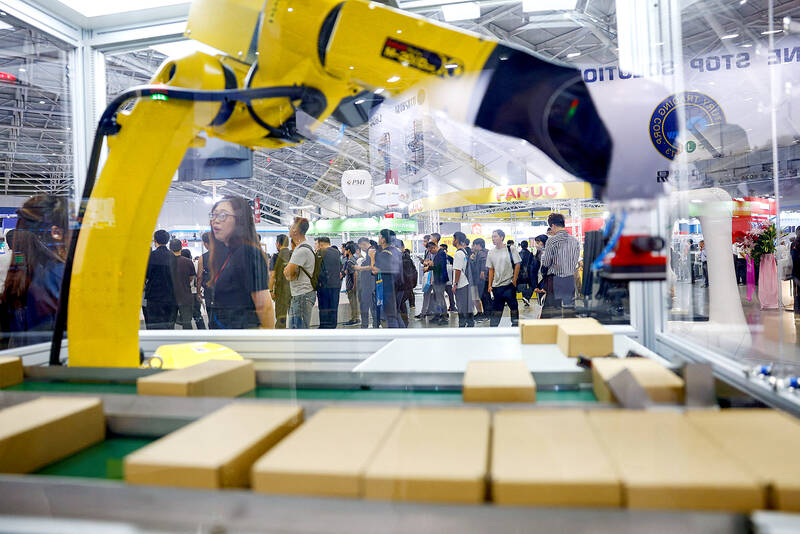The nation’s industrial production index rose 18.11 percent year-on-year to 113.53 last month, driven by strong demand for artificial intelligence (AI) and semiconductor-related applications, the Ministry of Economic Affairs said yesterday.
The manufacturing production index, which comprises 94.63 percent of the industrial production index, increased 19.55 percent year-on-year to 114.22, the ministry said.
It was the 17th consecutive month of growth and at the lower end of the ministry’s forecast of 114.18 to 118.18, Department of Statistics Deputy Director-General Chen Yu-fang (陳玉芳) told a news conference in Taipei.

Photo: Ann Wang, Reuters
In the first seven months of this year, the industrial and manufacturing production indices rose 16.85 percent and 18.02 percent from a year earlier respectively, the ministry said.
The manufacturing production index this month is expected to rise 9.6 to 13.5 percent annually, it said.
The ministry is cautious about growth next month and the remainder of the year, as the base period last year was relatively high, although AI demand and new consumer electronics are still expected to offer necessary support, Chen said.
The latest data showed electronic component production rose 29.52 percent and semiconductor production expanded 33.91 percent last month, the ministry said.
Production of computers, electronic goods and optical components grew 39.03 percent, driven by front-loading and AI demand. The ministry expects the potential launch of new consumer electronics by major brands to offer growth momentum next month, Chen said.
Flat panel and related component production decreased 2.98 percent, ending the growth trend since May, as declines in large-sized panels outweighed gains in medium and small-sized panels, the ministry said.
The data also reflected persistent weakness in traditional industries, with manufacturers mostly adopting a conservative, wait-and-see approach to business conditions.
Base metal production, mainly steel, fell 6.17 percent and chemical materials and fertilizers declined 4.29 percent amid weak demand and oversupply from China, Chen said.
Vehicle output also fell 2 percent as market demand remained weak amid tariff concerns, but machinery equipment production rose 7.62 percent, driven by demand for semiconductor production equipment amid chipmakers’ plant expansion plans, she added.

In Italy’s storied gold-making hubs, jewelers are reworking their designs to trim gold content as they race to blunt the effect of record prices and appeal to shoppers watching their budgets. Gold prices hit a record high on Thursday, surging near US$5,600 an ounce, more than double a year ago as geopolitical concerns and jitters over trade pushed investors toward the safe-haven asset. The rally is putting undue pressure on small artisans as they face mounting demands from customers, including international brands, to produce cheaper items, from signature pieces to wedding rings, according to interviews with four independent jewelers in Italy’s main

Japanese Prime Minister Sanae Takaichi has talked up the benefits of a weaker yen in a campaign speech, adopting a tone at odds with her finance ministry, which has refused to rule out any options to counter excessive foreign exchange volatility. Takaichi later softened her stance, saying she did not have a preference for the yen’s direction. “People say the weak yen is bad right now, but for export industries, it’s a major opportunity,” Takaichi said on Saturday at a rally for Liberal Democratic Party candidate Daishiro Yamagiwa in Kanagawa Prefecture ahead of a snap election on Sunday. “Whether it’s selling food or

CONCERNS: Tech companies investing in AI businesses that purchase their products have raised questions among investors that they are artificially propping up demand Nvidia Corp chief executive officer Jensen Huang (黃仁勳) on Saturday said that the company would be participating in OpenAI’s latest funding round, describing it as potentially “the largest investment we’ve ever made.” “We will invest a great deal of money,” Huang told reporters while visiting Taipei. “I believe in OpenAI. The work that they do is incredible. They’re one of the most consequential companies of our time.” Huang did not say exactly how much Nvidia might contribute, but described the investment as “huge.” “Let Sam announce how much he’s going to raise — it’s for him to decide,” Huang said, referring to OpenAI

The global server market is expected to grow 12.8 percent annually this year, with artificial intelligence (AI) servers projected to account for 16.5 percent, driven by continued investment in AI infrastructure by major cloud service providers (CSPs), market researcher TrendForce Corp (集邦科技) said yesterday. Global AI server shipments this year are expected to increase 28 percent year-on-year to more than 2.7 million units, driven by sustained demand from CSPs and government sovereign cloud projects, TrendForce analyst Frank Kung (龔明德) told the Taipei Times. Demand for GPU-based AI servers, including Nvidia Corp’s GB and Vera Rubin rack systems, is expected to remain high,